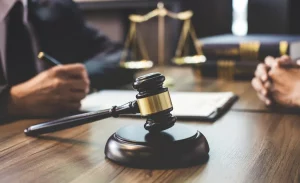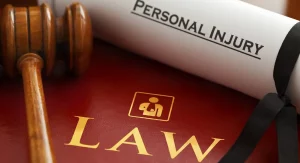How to Document Evidence for Your Personal Injury Claim
By TIMEOFINFO
March 28, 2023
Update on : March 29, 2023

Personal injury claims can be a lengthy and often challenging legal process that requires extensive documentation of evidence to support your case. Whether you’ve been injured in a car accident, a slip-and-fall, or any other form of personal injury, documenting evidence is crucial to prove the validity of your claim. The proper documentation of evidence can make or break your case, and it can determine whether or not you receive a fair settlement from the responsible party.
Buckingham Barrera Vega know how to document evidence for your personal injury claim is just as important as knowing what evidence to document. From witness statements to photographs and medical records, each piece of evidence can play a vital role in proving liability and damages. However, without proper documentation, the evidence may not be admissible in court or may not carry the weight necessary to persuade a judge or jury.
In this post, we will explore the key steps you need to take to document evidence for your personal injury claim. We’ll discuss the types of evidence that are essential to your case, the paperwork you need to acquire, and the best methods for preserving evidence. Let’s dive in!
-
Take photos of the scene and the injuries sustained
Photographs are critical pieces of evidence that can capture what may be impossible to recreate later on. It is essential to take these photos as soon as possible after the incident to ensure that all the relevant details are captured. Take photographs from different angles, and if possible, take photos of any other people involved in the accident. If you have visible injuries, take pictures of them as soon as possible, ensuring that the images are clear, detailed, and accurately show the extent of the injury. Remember, the more photos you take, the better your chances of building a strong case for your claim.
-
Collect contact information of witnesses and potential defendants
If you were involved in an accident, it is important to gather the names, phone numbers, and addresses of anyone who witnessed the incident. These individuals may be able to provide important testimony that can support your claim. In addition, you should also gather contact information for any potential defendants, such as the other driver involved in a car accident. This information will be important in case you need to contact them or their insurance company during the claims process.
-
Obtain copies of medical records and bills related to the injury
These documents serve as critical evidence to support your claim, and they can provide details about the extent of your injuries, the treatment you received, and the expenses incurred as a result. When collecting medical records, be sure to request copies of all diagnostic tests, imaging studies, progress notes, discharge summaries, and prescription medications. Bills should include all expenses related to medical treatment, including hospital stays, doctor visits, physical therapy, and any other costs incurred due to your injuries.
-
Keep a detailed record of missed work and wages lost
Start by documenting the dates you were unable to work due to your injury and the reason for each absence. You should also make note of the amount of income you would have earned if you had been able to work during those days. It’s crucial to have a clear understanding of the amount of wages lost as a result of your injury to properly evaluate and quantify your damages. You may be entitled to compensation for all wages you have lost and any future wages you are likely to lose due to your injury. Accurate documentation of missed work and wages lost can help strengthen your case and demonstrate the impact the injury has had on your life.
-
Document any emotional distress or physical pain experienced
Make sure to keep a detailed record of any medical treatment you received for your injuries, as well as any medications or therapies recommended by your healthcare provider. Also, write down any psychological effects you are experiencing, such as anxiety, depression, or post-traumatic stress disorder (PTSD). If possible, include a description of the level of pain you experience on a daily basis, and any physical limitations that you are facing.
-
Write down notes about conversations with insurance companies or lawyers
Keep a detailed record of the date, time, and duration of the conversation, as well as the name and contact information of the person(s) you spoke with. Writing a summary of the conversation and any agreements or promises made can also be helpful. Be sure to confirm any information discussed during the conversation in writing, whether that be through email or postal mail. This documentation will serve as valuable evidence in your case to help support your claims and protect your legal rights.
-
Save any physical evidence related to the injury, such as broken items or torn clothing
This includes any broken items or torn clothing that occurred during the incident. It’s important to save any physical evidence related to the accident, as it can provide a clear picture of what happened and help your case in court or negotiations. Physical evidence should be carefully preserved and not tampered with, as altering it could seriously harm your claim. Consider taking photographs and documenting in writing the condition of the evidence, and keep it in a safe place where it will not be damaged or lost. By preserving physical evidence, you can better demonstrate the full extent of the harm caused by the incident and increase your chances of receiving just compensation for your injuries.
-
Keep a journal of recovery progress and any ongoing treatment
This journal can be immensely helpful in providing evidence of the impact of your injuries on your daily life and the steps you have taken to recover. It can also serve as a detailed record of medical treatment, appointments, and expenses, providing important documentation to support your claim. Make sure to include dates, times, and descriptions of any pain, discomfort, limitations, or other symptoms you experience, as well as any medications or other treatments you receive. Additionally, make note of any lost wages or other financial losses resulting from your injuries.
-
Obtain police reports or incident reports related to the injury
Police reports contain valuable information that can corroborate your account of the events leading up to your injury. These reports typically include details such as the time and location of the incident, the identities of any witnesses, and the officer’s observations and opinions on the situation. Similarly, incident reports are typically created by businesses or property owners to document any accidents or injuries that occur on their premises.
-
Consult with a personal injury attorney as soon as possible to ensure all evidence is properly documented and utilized in your case.
One of the most critical steps in this process is to consult with a personal injury attorney as soon as possible. By doing so, you can ensure that all evidence is properly documented and utilized in your case. A skilled attorney will know what evidence is important to your case and can help you gather and preserve it. In addition, they can help guide you through the legal process, ensuring that you get the best possible outcome for your case. Don’t delay in seeking legal help, as important evidence can be lost or overlooked if you wait too long to take action.
Conclusion
Documenting evidence is an essential step in building a strong personal injury claim. It can be a daunting task, but by taking the time and effort to gather and organize all the necessary information, you can significantly increase your chances of receiving fair compensation for your injuries. Remember to keep detailed records, take photos and videos, gather witness statements, and seek medical attention as soon as possible. With this information on hand, you will be better equipped to negotiate with insurance companies and legal representatives, and ultimately receive the settlement you deserve.















